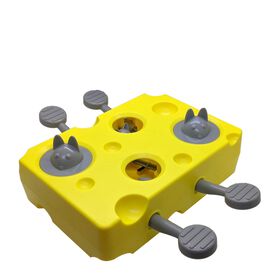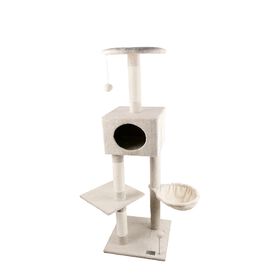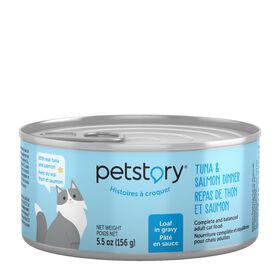Lovers of unique cat breeds are going crazy over the all new Lykois. Some find them hideous, while others are so charmed by their colour and coat they go as far as to compare them to werewolves! It’s safe to say nature has reserved quite a surprise for us!
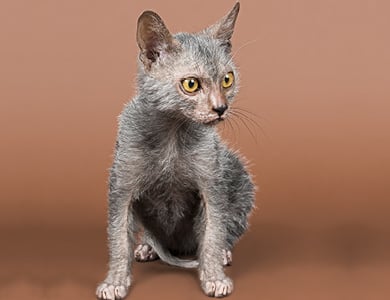 Origin
Origin
The name lykoi is greek for “wolf.” The breed is the result of a sudden genetic mutation in a black shorthaired domestic cat, one that drew the attention of breeders in 2010. The breed’s gene pool expanded with the appearance of new litters in Tennessee and Virginia (no relation between the parents) as well as another cat in Italy!
The Lykoi is a recent breed, and wasn’t actually recognized until 2013. Because breeders wanted to avoid problems related to consanguinity, and considering the rarity of the mutation, the Lykoi gene pool is rather small. As a result, there are very few of these cats around, and their rarity can often make them prohibitively expensive.

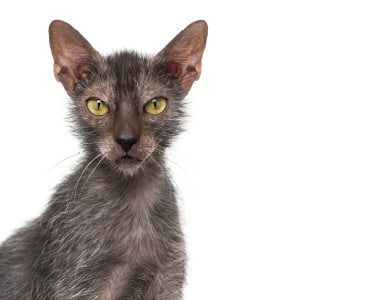 Morphology and appearance
Morphology and appearance
As you can tell, various parts of Lykoi’s body, i.e., the head and extremities, are bare — almost leathery. Their coat and disheveled salt & pepper fur give them an opossum-like appearance. They might look a little rough, but these cats are surprisingly tender when being petted. Expect partial, or even total shedding, depending on the season, as well as the cat’s growth and reproductive periods. Lykois’ appearance varies according to sex: females have a small size and weigh between 2 and 3 kilograms, while males weigh between 3.5 and 4.5 kilograms.

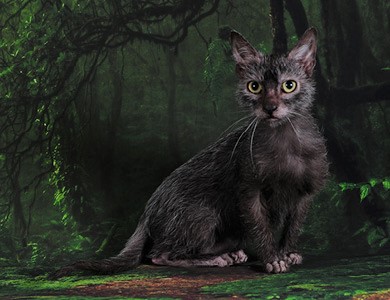 Required maintenance (grooming)
Required maintenance (grooming)
The reason for the Lykois’ original looking coat is simple: they don’t have an undercoat, while nearly every other breed of cat does! Lykois cats have no fur around the eyes nor on the nose. They will also lose any fur around the snout as well as the ears. There is hardly any fur at all on the paws.
This lack of fur may appear to make maintenance easy, but unfortunately this is not the case. You’re better off asking your vet [French only link] how to best care for the coat and fur of your Lykoi, whose needs will be similar to those of the Sphynx. Because the quantity of fur can differ for each individual cat, the needs of each will likewise be unique.

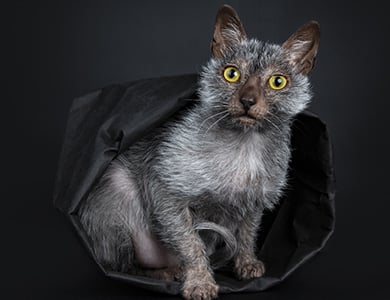 Behaviour
Behaviour
Don’t just stop at looks! You should choose your pet based on their innate character. Don’t, for instance, take the most timid one in the litter and put them in a busy and frantic environment. Due to their physiognomy, Lykois are relatively active cats and need a lot of playtime. Be sure to have a few toys at their disposal to keep them occupied and entertained!
Similar to the Sphynx, Lykois’ small amount of fur means they enjoy heat, and as a result, will likely latch on to you for body heat. Given their small stature, Lykois can easily squeeze into tight spaces. Be sure, therefore, that your house is prepared for this supercharged little ferret! Currently, Lykois are not widely known to be meowers, but this must be determined on a case-by-case basis. For instance, they may make extra noise if you do.
Unusual facts
This new breed of cat is the result of natural genetic mutation among shorthaired domestic cats. At first glance, they might appear sick or stricken with a skin issue, but this is not the case. Originally, it was thought they had a mutation like that of the Sphynx, but DNA tests refuted this hypothesis: There is no relation between the Sphynx and the Lykoi!
Now. Is this new breed of cat not adorable as it is intriguing? If you’re thinking of adopting one, be sure you go to an Anima Québec-certified breeder [French only link].



